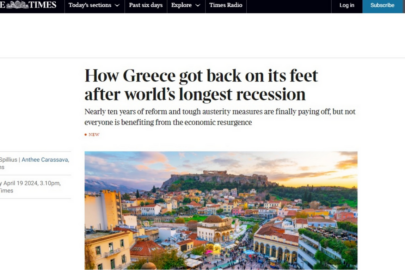Turkey’s economy is overheating and if the government doesn’t act then the country is in trouble, according to several analysts.
“The government has no intention of tackling imbalances or overheating,” Marcus Chenevix, global political research analyst at TS Lombard, said in a research note this week. “It is this unwillingness to act that leads us to believe that we can now say that Turkey is entering a slow burning crisis.”
The Turkish lira is at a record low against the dollar, and is ranked among the worst-performing currencies this year. After comments this week by Turkish President Recep Erdogan promising to lower interest rates after the country’s June election, the currency tanked to its lowest point yet against the greenback, hitting 4.4527 on Tuesday mid-afternoon. The dollar has appreciated by around 18 percent against the lira so far this year.
The reason? Erdogan has been sitting on interest rates, opting for a monetary policy that prioritizes growth over controlling its double-digit inflation. Turkey’s growth rate reached an impressive 7.4 percent for 2017 and leads the G-20, but at the expense of inflation, which has shot up to 10.9 percent.
Market sentiment has driven much of the lira’s sell-off, as investors worry about government intervention in monetary policy and central bank independence. Investors have been hoping for a rate rise by the bank, but that now appears unlikely.
Erdogan plays an unusually heavy-handed role in deciding his country’s monetary policy, and many observers say he keeps the Central Bank of the Republic of Turkey’s (TCMB) hands tied. The bank finally raised its rates for the first time in several sessions in late April, moving its late liquidity window rate (which it uses to set policy) up by 75 basis points to 13.5 percent. The lira temporarily jumped on the news.
But Erdogan aims to bring the rate back down, saying it must be done to ease pressure on Turkish households and drive the growth needed to create jobs for Turkey’s youth.
Troubling indicators
“I’m seriously concerned about the Turkish lira,” Piotr Matys, emerging markets FX strategist at Rabobank, told CNBC. “Is Turkey the domino the market expects to fall next? It’s got all those problems — high current account deficit, government borrowing in other currencies.”
Emerging market currencies have been feeling particular pain on the back of a strengthening dollar and higher yields in the U.S. But Erdogan’s monetary policy plans, Matys said, has resulted in the continued underperformance of the lira against its other emerging market counterparts. And the fall has been accelerated by geopolitical uncertainty over U.S. and Russian military actions in neighboring Syria.
March saw Turkey’s current account deficit — a measurement of the country’s trade — widen to $4.812 billion, compared to $4.5 billion the month prior and significantly higher than poll forecasts. The February current account deficit was a more than 60 percent increase on the same period in 2017.
“Turkish growth is unbalanced, inflation high rising, foreign debt costs ballooning and domestic FX expectations unmoored,” Chenevix said. “Downward pressure on Turkish assets will be back very soon.”
Pre-election damage control
Erdogan in April announced early elections in what was widely viewed as a power grab. Presidential and parliamentary elections slated for November 2019 will now be held in June of this year, with the turbulent economy seen as the main reason for the impromptu switch.
A win would allow Erdogan to mitigate the fallout of a worsening economy on his popularity. It would also enable him to eliminate the position of prime minister and weaken parliament, thanks to a constitutional referendum passed last year that would heavily concentrate the president’s power.
Source: cnbc





































